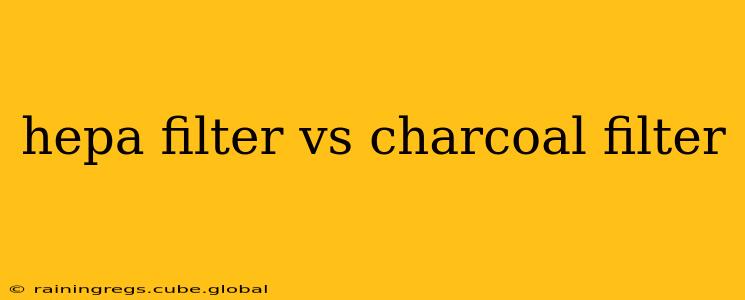Choosing the right air purifier can significantly impact your indoor air quality and overall well-being. A crucial element of any air purifier is its filter. Two popular types are HEPA filters and charcoal filters, each designed to tackle different pollutants. Understanding their strengths and weaknesses is key to making an informed decision. This comprehensive guide will delve into the specifics of HEPA vs. charcoal filters, helping you choose the best option for your needs.
What is a HEPA Filter?
HEPA stands for High-Efficiency Particulate Air. HEPA filters are designed to capture microscopic particles from the air, including dust mites, pollen, pet dander, mold spores, and even some bacteria and viruses. A true HEPA filter must meet a specific standard: it must remove at least 99.97% of particles 0.3 microns in size or larger. Particles smaller than 0.3 microns are actually more difficult for a HEPA filter to capture, but the overall efficiency is still very high.
Advantages of HEPA Filters:
- High particle removal efficiency: HEPA filters excel at removing a wide range of airborne particles.
- Improved allergy and asthma symptoms: By significantly reducing allergens, HEPA filters can alleviate allergy and asthma symptoms for many people.
- Effective against various pollutants: They capture various particles, making them suitable for various environments and needs.
Disadvantages of HEPA Filters:
- Can't remove gases and odors: HEPA filters are not designed to remove gases, volatile organic compounds (VOCs), or odors.
- Requires replacement: HEPA filters need replacing periodically, depending on usage and air quality. A clogged filter reduces efficiency.
- Can be more expensive: HEPA filters are generally more expensive than other filter types.
What is a Charcoal Filter (Activated Carbon Filter)?
Charcoal filters, also known as activated carbon filters, utilize activated charcoal (a highly porous material) to absorb various gases and odors from the air. These filters are particularly effective at removing volatile organic compounds (VOCs), smoke, pet odors, and other gaseous pollutants. The activated carbon's large surface area allows it to trap these molecules.
Advantages of Charcoal Filters:
- Effective odor removal: Charcoal filters are excellent at eliminating unpleasant smells from various sources.
- Removes gaseous pollutants: They effectively capture VOCs, smoke, and other gaseous contaminants.
- Can be relatively inexpensive: Compared to HEPA filters, charcoal filters are often more affordable.
Disadvantages of Charcoal Filters:
- Limited particle removal: Charcoal filters do not effectively remove particulate matter like dust or pollen.
- Saturation and replacement: Charcoal filters become saturated over time and need replacing, reducing their effectiveness.
- May not address all odors: While highly effective for many odors, some particularly strong or persistent smells may not be completely eliminated.
HEPA Filter vs. Charcoal Filter: Which One Should You Choose?
The best choice depends on your specific needs and the type of air pollutants you're trying to address.
- For allergies and particulate matter: A HEPA filter is the better choice.
- For odors and gaseous pollutants: A charcoal filter is more effective.
- For optimal air purification: Many high-end air purifiers combine both HEPA and charcoal filters for comprehensive air cleaning. This combination tackles both particles and gases effectively.
What are the different types of HEPA filters?
There isn't a strict categorization of "types" of HEPA filters, but the key difference lies in the filter's construction and the particle size it can effectively capture. The term "True HEPA" refers to filters meeting the 99.97% efficiency standard for 0.3-micron particles. Some manufacturers might use the term "HEPA-like" or "HEPA-type" for filters that don't quite meet this standard but still offer significant particle removal. Always check the filter's specifications to confirm its efficiency rating.
How often should I replace my HEPA filter?
HEPA filter replacement frequency depends on factors like usage, air quality, and the filter's construction. Manufacturers usually provide replacement guidelines, but a good rule of thumb is to replace your HEPA filter every 6-12 months, or sooner if you notice a significant reduction in airflow or performance. Always check your air purifier's user manual for specific recommendations.
How long do charcoal filters last?
Similar to HEPA filters, the lifespan of a charcoal filter depends on usage and the level of airborne contaminants. Generally, charcoal filters need replacing every 3-6 months, or when you notice a significant reduction in odor removal capabilities. Regularly inspect and replace the filter as recommended by the manufacturer to maintain optimal air purification.
By carefully considering these factors and your individual needs, you can choose the air purifier filter that best suits your home environment and improves your indoor air quality. Remember to always refer to the manufacturer's instructions for proper filter usage and replacement.
